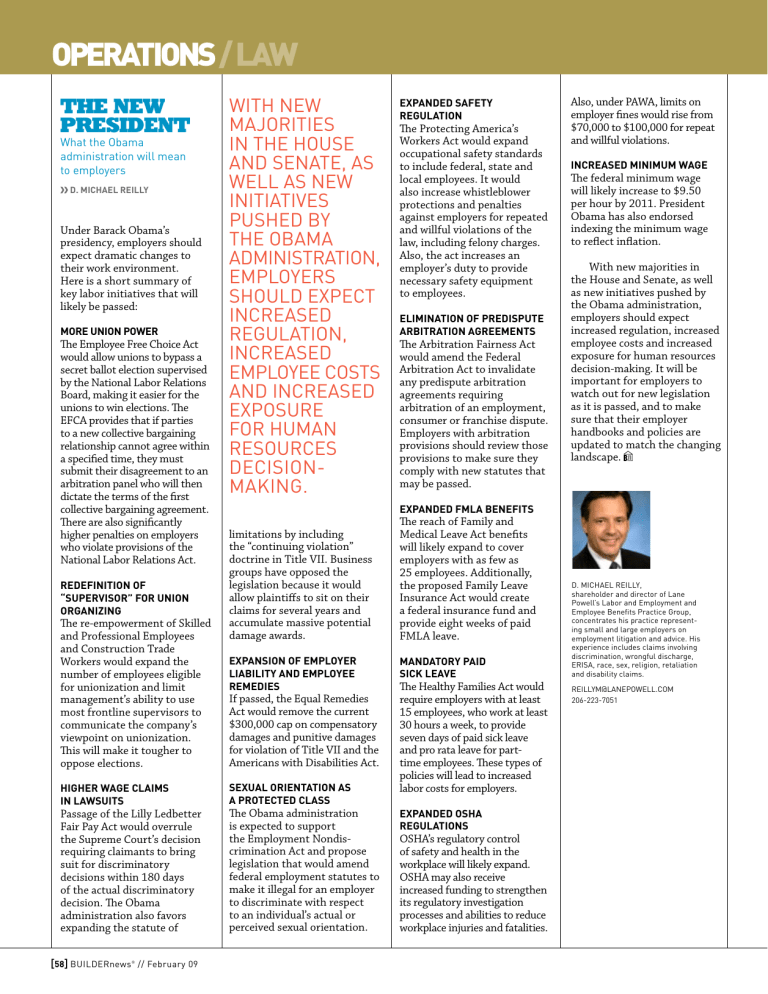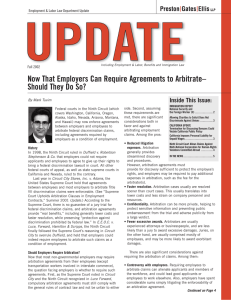The Protecting America’s Workers Act would expand occupational safety standards

OPERATIONS / LAW
the new president
What the Obama administration will mean to employers
d. MiCHael reilly
Under Barack Obama’s presidency, employers should expect dramatic changes to their work environment.
Here is a short summary of key labor initiatives that will likely be passed:
More Union Power
The Employee Free Choice Act would allow unions to bypass a secret ballot election supervised by the National Labor Relations
Board, making it easier for the unions to win elections. The
EFCA provides that if parties to a new collective bargaining relationship cannot agree within a specified time, they must submit their disagreement to an arbitration panel who will then dictate the terms of the first collective bargaining agreement.
There are also significantly higher penalties on employers who violate provisions of the
National Labor Relations Act.
redefinition of
“SUPerviSor” for Union organizing
The re-empowerment of Skilled and Professional Employees and Construction Trade
Workers would expand the number of employees eligible for unionization and limit management’s ability to use most frontline supervisors to communicate the company’s viewpoint on unionization.
This will make it tougher to oppose elections.
HigHer wage ClaiMS in lawSUitS
Passage of the Lilly Ledbetter
Fair Pay Act would overrule the Supreme Court’s decision requiring claimants to bring suit for discriminatory decisions within 180 days of the actual discriminatory decision. The Obama administration also favors expanding the statute of
With neW majOrities in the hOuse and senate, as
Well as neW initiatives pushed by the Obama administratiOn, emplOyers shOuld expect increased regulatiOn, increased emplOyee cOsts and increased expOsure fOr human resOurces decisiOn- making.
limitations by including the “continuing violation” doctrine in Title VII. Business groups have opposed the legislation because it would allow plaintiffs to sit on their claims for several years and accumulate massive potential damage awards.
exPanSion of eMPloyer liability and eMPloyee reMedieS
If passed, the Equal Remedies
Act would remove the current
$300,000 cap on compensatory damages and punitive damages for violation of Title VII and the
Americans with Disabilities Act.
SexUal orientation aS a ProteCted ClaSS
The Obama administration is expected to support the Employment Nondiscrimination Act and propose legislation that would amend federal employment statutes to make it illegal for an employer to discriminate with respect to an individual’s actual or perceived sexual orientation. exPanded Safety regUlation
The Protecting America’s
Workers Act would expand occupational safety standards to include federal, state and local employees. It would also increase whistleblower protections and penalties against employers for repeated and willful violations of the law, including felony charges.
Also, the act increases an employer’s duty to provide necessary safety equipment to employees.
eliMination of PrediSPUte arbitration agreeMentS
The Arbitration Fairness Act would amend the Federal
Arbitration Act to invalidate any predispute arbitration agreements requiring arbitration of an employment, consumer or franchise dispute.
Employers with arbitration provisions should review those provisions to make sure they comply with new statutes that may be passed.
exPanded fMla benefitS
The reach of Family and
Medical Leave Act benefits will likely expand to cover employers with as few as
25 employees. Additionally, the proposed Family Leave
Insurance Act would create a federal insurance fund and provide eight weeks of paid
FMLA leave.
Mandatory Paid
SiCk leave
The Healthy Families Act would require employers with at least
15 employees, who work at least
30 hours a week, to provide seven days of paid sick leave and pro rata leave for parttime employees. These types of policies will lead to increased labor costs for employers.
exPanded oSHa regUlationS
OSHA’s regulatory control of safety and health in the workplace will likely expand.
OSHA may also receive increased funding to strengthen its regulatory investigation processes and abilities to reduce workplace injuries and fatalities.
Also, under PAWA, limits on employer fines would rise from
$70,000 to $100,000 for repeat and willful violations.
inCreaSed MiniMUM wage
The federal minimum wage will likely increase to $9.50 per hour by 2011. President
Obama has also endorsed indexing the minimum wage to reflect inflation.
With new majorities in the House and Senate, as well as new initiatives pushed by the Obama administration, employers should expect increased regulation, increased employee costs and increased exposure for human resources decision-making. It will be important for employers to watch out for new legislation as it is passed, and to make sure that their employer handbooks and policies are updated to match the changing landscape. d. michael reilly, shareholder and director of lane powell’s labor and employment and employee benefits practice group, concentrates his practice representing small and large employers on employment litigation and advice. his experience includes claims involving discrimination, wrongful discharge, erisa, race, sex, religion, retaliation and disability claims. reillym@lanepOWell.cOm
206-223-7051
[ 58 ] buildernews ® // february 09



